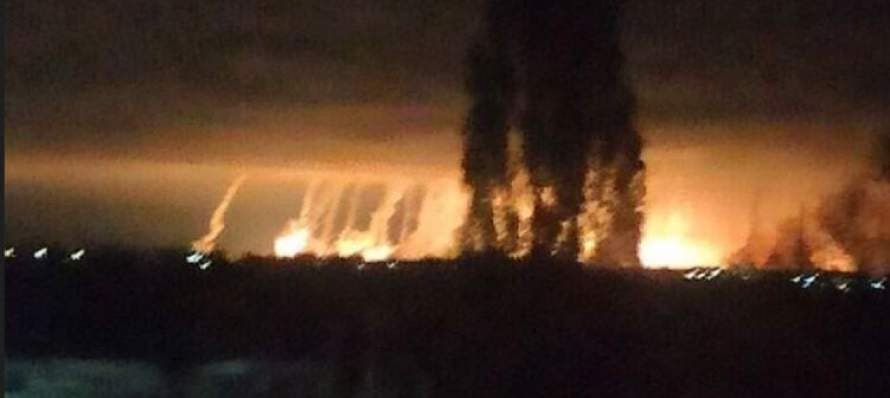The Pavlograd Chemical Plant was targeted during a series of Russian missile strikes last night, causing the catastrophic detonation of Soviet-era solid rocket fuel stored at the site.
??The first moments of the explosion in Pavlograd after yesterday's strike of Russian cruise missiles. pic.twitter.com/k5QJiX4EL4
— War Monitor (@WarMonitors) May 1, 2023
Footage of the strike was captured in several videos, leading online GEOINTers to confirm the strike took place at the chemical plant. Some Russian sources were quick to alleged that the strike targeted a key rail junction in the city and destroyed anti-aircraft systems for the upcoming Spring offensive by Ukrainian forces, however, the strike was geolocated to the plant at (48.582440, 35.849209).
The Pavlograd Chemical Plant has long been known as a facility that stores Soviet-era rocket fuel and components. Following the collapse of the Soviet Union, the site was used to store some 5,000 tons of solid rocket fuel from decommissioned military missiles. While originally financed by the United States, disposal of the rocket fuel slowed significantly in 2004 when funding was left entirely to the Ukrainian government. Over the next decade, funding dwindled until the program was cut in 2018. By 2020, over 1,800 tons of rocket fuel remained on site as the plant lacked financial resources to carry out disposal operations on its own.
New video of the Pavlohrad blast seems to confirm that the plant storing old SS-24 boosters was hit in the Russian strike.
While not good, this was the better case scenario.
Satellite imagery should be able to confirm the location and show the scale of the damage shortly. pic.twitter.com/uuBqQj5tFl
— Oliver Alexander (@OAlexanderDK) May 1, 2023
A 2020 article by the BBC highlighted the threat that the plant poses to the area. The plant’s general director told the outlet that the plant poses a economic and ecological danger to Pavlograd and its surrounding areas, adding that it would take decades to recover if the plant were to face an emergency.
He explained that “We remember when there was an emergency in Balaklei. They simply ignored the rules for handling the rocket fuel that was in the engine. And we were talking about only 180 kg of solid rocket fuel. For comparison, one stage contains 50,000 kg. And in total on our territory – 1.8 million kg.”
Likewise, residents and former employees had expressed fears about the safety of the plan and the impacts it would have to the area in the event of an emergency. A former employ of the plant told BBC that “Every time we went to work, we didn’t know if we would return home,” adding that “we find ourselves on the threshold of an emergency situation, but on the scale of the whole city.
“We are not told anything about the danger that is currently hanging over the city and the entire region. If something happens, it will be an unpleasant surprise for us. The city today is not ready for the difficulties that may arise in the event of an emergency,” another employee stated.


